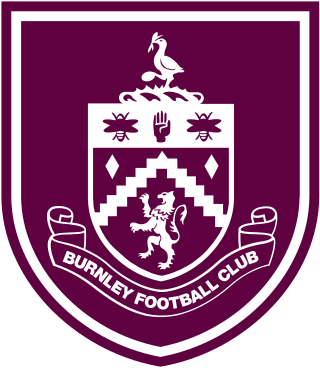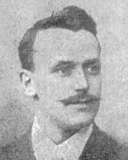
Burnley Football Club is an English association football club based in Burnley, Lancashire, that competes in the Premier League, the first tier of English football. Founded on 18 May 1882, the club was one of the first to become professional and subsequently put pressure on the Football Association to permit payments to players. The club entered the FA Cup for the first time in 1885–86 and was one of the 12 founder members of the Football League in 1888–89. From the 1950s until the 1970s, under chairman Bob Lord, the club became renowned for its youth policy and scouting system, and was one of the first to set up a purpose-built training ground.

Turf Moor is an association football stadium in Burnley, Lancashire, England, which has been the home of Burnley Football Club since 1883. This unbroken service makes Turf Moor the second-longest continuously used ground in English professional football. The stadium is situated on Harry Potts Way, named after the manager who won the 1959–60 First Division with the club, and has a capacity of 21,944.
Henry Bradshaw was an English football manager.

Walter Abbott was an English professional footballer who scored 104 goals from 391 games in the Football League playing for Small Heath, Everton and Burnley. He was capped once for the England national team.
Frederick Reginald Attwell was an English professional association footballer who played as a right wing-half. He played in the Football League for West Ham United, Burnley and Bradford City, and also had spells in non-league football.
The 1888–89 season was the seventh season in Burnley Football Club's history, and their first in league competition following the formation of the Football League in 1888. The side finished ninth in their inaugural league campaign, and as one of the bottom four teams in the division, they were forced to apply for re-election to return for the following season. Burnley began the season on 8 September 1888 with a 2–5 defeat away at Preston North End, who went on to be crowned league champions that year. In the next match, Burnley achieved their first league victory when they won 4–3 against Bolton Wanderers, with William Tait becoming the first player in history to score a league hat-trick.

John Haworth was an English football manager. After playing amateur football as a youth, he was appointed manager of Accrington Stanley in 1897. He was in charge of the team for 13 years, leading them to two Lancashire Combination titles, before moving to nearby Burnley in July 1910. His 14-year spell as secretary-manager of Burnley was highly successful and guided the team to an FA Cup victory and a Football League championship. Haworth is the only Burnley manager to date to have won the FA Cup.
The 1920–21 season was Burnley's 29th season in the Football League, and their 4th consecutive campaign in the Football League First Division, the top tier of English football. Burnley were confident of success ahead of the season, having finished as First Division runners-up in 1919–20. After losing their first three games, Burnley embarked on a 30-match unbeaten league run from 4 September 1920 until 26 March 1921, winning the First Division and becoming English champions for the first time in their history. Burnley's unbeaten run stood as a single-season Football League record for over 80 years, until it was bettered by Arsenal in the 2003–04 season. Burnley ended the 1920–21 season on 59 points, having won 23 games, drawn 13, and lost 6.
Trawden Forest Football Club was an English association football club based in the village of Trawden in Lancashire and playing their matches at Cottontree, Colne.
The 1932–33 season was Burnley's 45th season of league football.
Alexander Hughes was an English professional association footballer who played as a full-back. Born in Hetton-le-Hole, County Durham, he played in Scotland with Heart of Midlothian before joining Football League Second Division side Burnley in August 1931. Predominantly a reserve player, Hughes made his first-team debut for Burnley on 21 November 1931 in the 0–5 defeat to Leeds United at Turf Moor. He then spent four months out of the team before returning for the games against Bradford City and Bristol City in March 1932. Hughes then played the entire 1932–33 campaign in the reserves before leaving Burnley to sign for Accrington Stanley in August 1933. He spent one season at Peel Park, but failed to make an appearance for Accrington and left the following year.
The 1889–90 season was the eighth season in the history of Burnley Football Club and their second in the Football League. Burnley ended the season in 11th position with a record of 4 wins, 5 draws and 13 defeats. As a result, the club was forced to apply for re-election to the League for the following season; the application was successful and Burnley retained their berth for the 1890–91 campaign. Burnley lost eight consecutive matches between 9 November 1889 and 22 February 1890 and did not achieve their first win in the League until 1 March 1890, when they beat Bolton Wanderers 7–0. The team was knocked out by Sheffield United in the First Round of the FA Cup, but they had success in the Lancashire Senior Cup, beating Rossendale United, Higher Walton and Haydock on the way to the final, where they defeated rivals Blackburn Rovers by two goals to nil.
The 1890–91 season was the ninth season in the history of Burnley Football Club and their third in the Football League. Burnley ended the season in eighth position with a record of 9 wins, 3 draws and 10 defeats, thus finishing outside the bottom four for the first time. Scottish forwards Claude Lambie and Alexander McLardie were the top goalscorers, with 16 and 14 league goals respectively. Burnley progressed to the Second Round of the FA Cup for the first time in two years, before being knocked out by Notts County. During the season 24 different players were used by Burnley, with many of the squad hailing from Scotland. In the 6–2 win against Preston North End on 7 March 1891, striker Tom Nicol became the first and only Burnley player to score a hat-trick on his League debut.
The 1891–92 season was the tenth season in the history of Burnley Football Club and their fourth in The Football League. It was, up to that point, their most successful League season as the team finished in seventh place, with a record of 11 wins, 4 draws and 11 defeats. The top goalscorer was Scottish forward Tom Nicol, who scored 18 goals in 27 league and cup matches, while fellow Scot Alexander McLardie was the runner-up with 10 goals.
The 1991–92 season was Burnley's 104th season of League football and their seventh consecutive campaign in the fourth tier of English football. Frank Casper started the season as manager, having been appointed to the post two years previously, before he was replaced by Jimmy Mullen in October 1991.
The 1898–99 Burnley F.C. season was the 17th season in the history of Burnley Football Club and their 11th in the Football League.
The 1899–1900 Burnley F.C. season was the 18th season in the history of Burnley Football Club and their 12th in the Football League.
Burnley Football Club is an English professional association football club based in Burnley, Lancashire. It was founded on 18 May 1882 by members of rugby club Burnley Rovers, who voted for a change from rugby to association football. The suffix "Rovers" was dropped in the following days. Burnley became professional in 1883—one of the first to do so—putting pressure on the Football Association (FA) to permit payments to players. In 1885, the FA legalised professionalism, so the team entered the FA Cup for the first time in 1885–86, and were one of the twelve founder members of the Football League in 1888–89.




